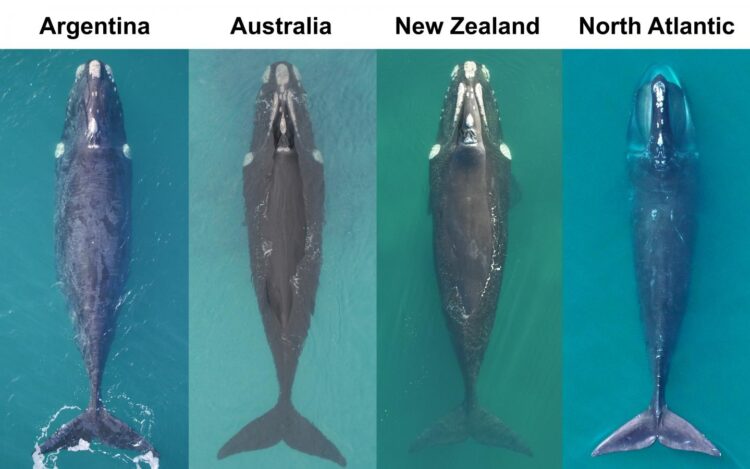New research by an international team of scientists reveals that endangered North Atlantic right whales are in much poorer body condition than their counterparts in the southern hemisphere

Credit: Fredrik Christiansen (left & center-left), Stephen M. Dawson (center-right), John W. Durban and Holly Fearnbach (right).
New research by an international team of scientists reveals that endangered North Atlantic right whales are in much poorer body condition than their counterparts in the southern hemisphere. The alarming results from this research, led by Dr Fredrik Christiansen from Aarhus University in Denmark, were published last week in the journal Marine Ecology Progress Series.
Since large-scale commercial whaling stopped in the last century, most populations of southern right whales have recovered well, and now there are about 10,000 – 15,000 right whales in the southern hemisphere. Unfortunately, the same cannot be said for the North Atlantic right whales, found today off the east coast of North America. There are only around 410 individuals left, and the species is heading to extinction.
A number of known challenges cause the dissimilar and unfortunate development of the two different whale populations: Lethal vessel strikes and entanglement in fishing gear continue to kill and harm the North Atlantic right whales. Individual North Atlantic right whales also have to deal with frequent entanglements in fishing gear, in particular lobster and crab pots, which drains their energy. These burdens, along with a change in the abundance and distribution of their main source of food, copepods and krill, have left the whales thin and unhealthy, which makes them less likely to have a calf.
All this contributes to the current overall decline of the species. But so far, it has not been fully understood, how the body condition of the whales was affected by the different conditions in the north Atlantic.
Cross-continental study of whales’ body condition
To quantify the ‘thin and unhealthy’ state of the North Atlantic right whales, Dr Christiansen and an international team of scientists have investigated the body condition of individual North Atlantic right whales, and compared their condition with individuals from three increasing populations of Southern right whales: off Argentina, Australia and New Zealand.
“Good body condition and abundant fat reserves are crucial for the reproduction of large whales, including right whales, as the animals rely on these energy stores during the breeding season when they are mostly fasting,” said Dr Fredrik Christiansen from Aarhus Institute of Advanced Studies and Department of Biology, Aarhus University, Denmark, and lead author of the study. “Stored fat reserves are particularly important for mothers, who need the extra energy to support the growth of their newborn calf while they are nursing.”
How fat are right whales?
The study is the largest assessment of the body condition of baleen whales in the world, and involved researchers from 12 institutes in five countries. The international research team used drones and a method called ‘aerial photogrammetry’ to measure the body length and width of individual right whales in these four regions around the world. From aerial photographs, the researchers were able to estimate the body volume of individual whales, which they then used to derive an index of body condition or relative fatness.
The analyses revealed that individual North Atlantic right whales, juveniles, adults and mothers, were all in poorer body condition than individual whales from the three other populations of Southern right whales. This difference is alarming, since poor body condition for North Atlantic right whales explains why too many of them are dying, and why they are not giving birth to enough calves to boost the population’s recovery. It may also be affecting their growth, and delaying juveniles in reaching sexual maturity. The combined impacts on individuals help explain why the species is in decline.
“For North Atlantic right whales as individuals, and as a species, things are going terribly wrong. This comparison with their southern hemisphere relatives shows that most individual North Atlantic right whales are in much worse condition than they should be,” said Dr Michael Moore from the Woods Hole Oceanographic Institution. “Sub-lethal entanglement trauma, along with changing food supplies is making them too skinny to reproduce well, and lethal entanglement and vessel trauma are killing them. To reverse these changes, we must: redirect vessels way from, and reduce their speed in, right whale habitat; retrieve crab and lobster traps without rope in the water column using available technologies; and minimize ocean noise from its many sources.”
“Right whales are a sentinel species of ocean health. They are warning us, and their message is strong – the seas that used to be a safe haven for whales are now a threat. We must act now to protect their home, everybody´s home,” said Dr Mariano Sironi from Instituto de Conservación de Ballenas and right whale researcher in Argentina.
###
Media Contact
Fredrik Christiansen
[email protected]
Related Journal Article
http://dx.





